Sept 2007
Sept 2007 sadmin2010 WORLD CUP
2010 WORLD CUP sadmin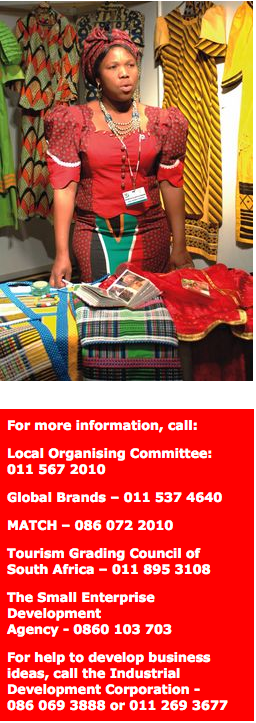 Making the most of 2010
Making the most of 2010
Only God can take it away,” said FIFA President, Sepp Blatter about reports that there were plans to take the 2010 World Cup to another country. Talking at the 2010 Business Opportunities Conference in June, Blatter assured South Africans that they would host the greatest sporting event in the world. “We will ensure that the 2010 World Cup is something South Africa and Africa will be proud of,” he said.
FIFA is going all out to support government and everyone else involved in the event. “This will ensure that the World Cup is done the African way and will be a major success,” he said.
Opportunities
South Africans must be ready to welcome about 400 000 foreign visitors. It will boost the country’s economy by about R51 billion. The World Cup will bring a lot of business opportunities to our doorstep in things like accommodation, catering, tourism, transport, construction, security and manufacturing.
The Business Opportunities Conference, held by the 2010 Local Organising Committee, the Department of Trade and Industry and the Ekurhuleni Municipality, looked at some opportunities for small and big businesses.
Follow the rules
People who want to use these opportunities, must follow the proper channels. This includes registering your business and following the FIFA rules. It also means you must sign a contract with MATCH and Global Brand.
MATCH is the name of a company that provides services to FIFA in areas like accommodation.
Global Brand is a company responsible for licensing the FIFA logo for businesses. The 2010 FIFA World Cup logo may not be displayed or used anywhere for business purposes if you don’t have a licence. For example, you are not allowed to print T-shirts, caps or bags with the 2010 World Cup logo without a licence.
Something different
Jaime Byrom from MATCH said that visitors would be looking for something different that is truly African. They will not look for it in big-name hotels, but will want to see the real South Africa in small towns and villages.
MATCH will register more than 55 000 rooms for international soccer fans all over the country.
MATCH will also encourage communities to get together or form co-operatives and register their areas as 2010 satellite centres for accommodation.
To qualify as a satellite centre, at least 200 rooms should have been registered and graded by the Tourism Grading Council of South Africa.
From next year, government will contribute 50 per cent to grading fees through the Department of Trade and Industry.
Co-operatives
Small businesses are encouraged to come together and form co-operatives to get bigger shares of the business. They should contact the Local Organising Committee to find out where services are needed.
- Ndivhuwo Khangale
2010 is an opportunity to speed up growth and development in South Africa. It is also a chance to market our country and Africa to the world. Even though doing business in certain areas, like stadiums, will be limited to FIFA and its sponsors, there will also be opportunities for local entrepreneurs.
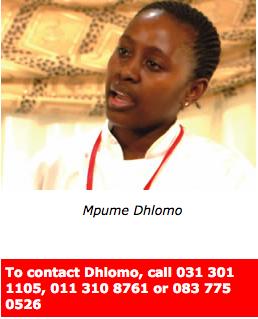 GETTING A TRUE TASTE OF AFRICA
GETTING A TRUE TASTE OF AFRICA
At the 2010 Business Conference, people talked about different business opportunities including those with food and drinks.
Mpume Dhlomo was one of the entrepreneurs who exhibited her products - special African dishes mixed with European flavours.
Dhlomo of Pinetown, KwaZulu-Natal, runs a restaurant called Africa Meets Europe. “African food must find its way to hotels and smart restaurants. There is no reason why you can’t have pumpkin leaves, livers and pap in hotels and restaurants. You just have to make it classy,” said the 32-year-old cook, who has exhibited her food in France and other European countries.
One of her delicious recipes is amadumbe with olive oil, salt and pepper, mixed with white sauce and Italian pesto (a sauce made from fresh basil and garlic, usually served with pasta or grilled meat).
Dhlomo also serves chicken livers with cornbread and imbuya - a traditional herb that can be mixed with pumpkin leaves or with Asian sauces.
GIVE VISITORS SOMETHING DIFFERENT
Transport
About 10 000 taxis will be needed to transport people to stadiums, shopping centres and tourist attractions. To be awarded a transport tender, taxi owners and drivers must come up with something different that will attract visitors.
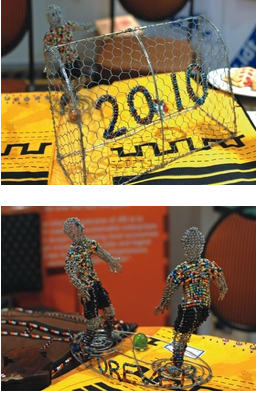 Fan fest parks
Fan fest parks
Fan fest parks are areas where lots of people who don’t have tickets for the stadiums will watch the games on big screens.
Security, food and drinks, transport, cleaning services and entertainment will be needed at the Fan fest parks.
Entertainment
Africa is known for its big five group of animals – lion, elephant, buffalo, leopard and rhino. Every area in the country should have its own big five. They don’t have to be animals, but can be other things that will give visitors a special African experience. It can include traditional dancing and singing, arts and crafts, story telling and poetry, bush walks and bird watching.
Food and clothing
Food will be an important way for visitors to get a real taste of Africa. Restaurants and other food outlets can offer traditional dishes, snacks and drinks.
Visitors will also like to take home clothing with a special African look.
Cartoon strip
Cartoon strip sadmin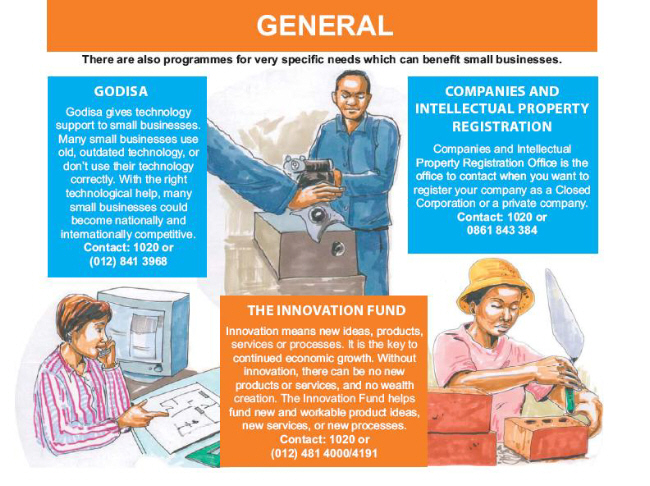
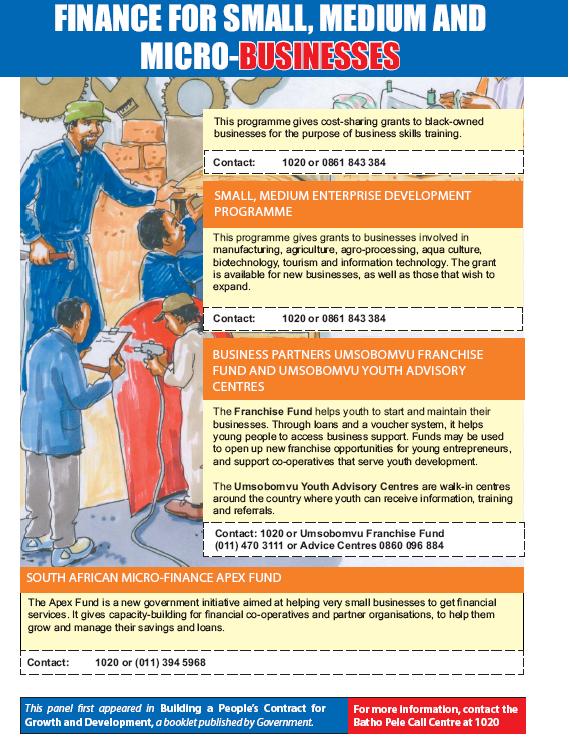
Celebrating our heritage
Celebrating our heritage sadmin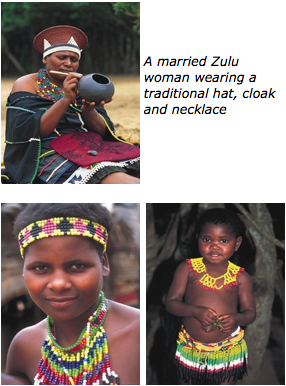 Zulu traditional dress
Zulu traditional dress
South Africa has a rich variety of cultures and traditions. To celebrate this, we have started a new series which will highlight a different culture in each issue of Vuk'uzenzele. The first of the series looks at traditional Zulu dress and its meaning.
Zulu women and girls
Traditional clothing is an important part of Zulu culture. It is colourful and bright and usually includes beautiful bead- work for women and children.
Married women have special status and wear different clothing to unmarried girls. Women who had a traditional Zulu wedding may wear a special wide hat called “isicholo” as a status symbol. “Ibhayi” is the cloak or shawl worn around the shoulders as a sign of respect to the in-laws. Married women also wear necklaces called “ureyisi” and cow-hide skirts called “isidwaba.”
Unmarried girls’ clothing include long strips of twisted beads called “izincu” around their ankles, elbows and waists. Young girls also wear short beaded skirts, colourful necklaces and beaded headbands. Children wear bead-work around their waists and necks.
- KwaZulu-Natal University
Zulu men
Zulu men traditionally wear a variety of clothing made from different animal hides. Like married women, married men also have special status. The front coverings for married men, for example, is called “umutsha” and differs from those worn by boys, which are smaller and called “iqoyi”. The back covering worn by men is called “ibheshu”.
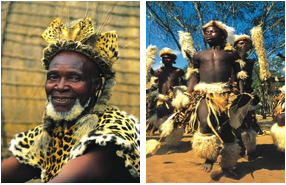 “Isicoco” is a head-ring worn by men and “imbhata” is a circular cowhide skin worn around a man’s neck. It used to be worn only by men who had killed another in battle. The shield worn with battle dress is called “ihawu”. Battle dress also include arm and ankle bands made of animal hide.
“Isicoco” is a head-ring worn by men and “imbhata” is a circular cowhide skin worn around a man’s neck. It used to be worn only by men who had killed another in battle. The shield worn with battle dress is called “ihawu”. Battle dress also include arm and ankle bands made of animal hide.
- KwaZulu-Natal University
FREEDOM PARK
FREEDOM PARK sadmin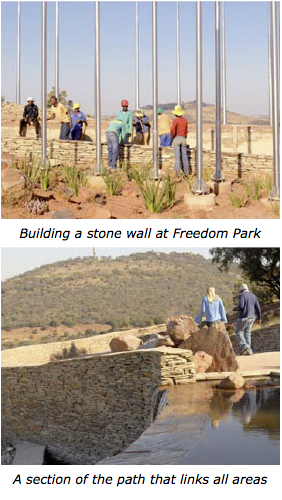 A PLACE FOR HEALING AND CLEANSING
A PLACE FOR HEALING AND CLEANSING
"Freedom Park is not a place of grief and mourning, but of celebration; a tribute to African and human dignity, and a place for the renewal of the human spirit." - President Thabo Mbeki
Songs of freedom fill the air when you enter Freedom Park.
This heritage site on the Salvokop hill in Pretoria is a symbol of the struggle for humanity and freedom. It is also a spiritual place for healing and cleansing of the spirits of people who fought for freedom. But it does not only focus on the struggle against apartheid, it also tells the story of South Africa’s history and culture from long ago until today.
Stone walls
From Freedom Park you have a beautiful view of Pretoria and the areas around it.
One of the most striking things about the site is the walls and paths made of carved stones from Limpopo. The stone walls show the names of people who died during the country’s different periods of conflict. These include times of slavery, wars of resistance, the Anglo Boer wars, the first and second world wars and the struggle for liberation from apartheid.
Language and culture
Each area of the park has a special meaning and represents a different part of the country’s history. All our languages and cultures are also represented like, for example, in the names of the areas.
The park is open to the public and is ideal for school tours, business functions, tourists, family picnics and cleansing ceremonies.
Some areas are still being built, but everything will be completed by 2009.
-Ndivhuwo Khangale
- The main areas of Freedom Park
- Isivavane represents the resting place of the spirits of those who gave their lives in the struggle for freedom.
- Sikhumbuto commemorates the main periods of conflict in South Africa’s history.
- Tiva is a still body of water where peace and calmness is felt.
- //hapo is the museum where South African history, dating back from
- 3,6 billion years is showed with pictures and sound.
- The Pan African Archives is where the country’s history is stored in computers for the public.
- Moshate is the place where people can get together and talk.
- Uitspanplek, which means resting place in Afrikaans, is an area where the whole family can spend the day relaxing.
- The amphitheatre is a large open-air theatre with seating for about
- 2 000 people. It is ideal for festivals and outdoor activities.
- Mveledzo is a path that links all the
- areas to form one single monument
-
festivals and outdoor activities.
For more on Freedom Park, call 012 470 7400, or visit the website at www.freedompark.co.za
FUN PAGE
FUN PAGE sadmin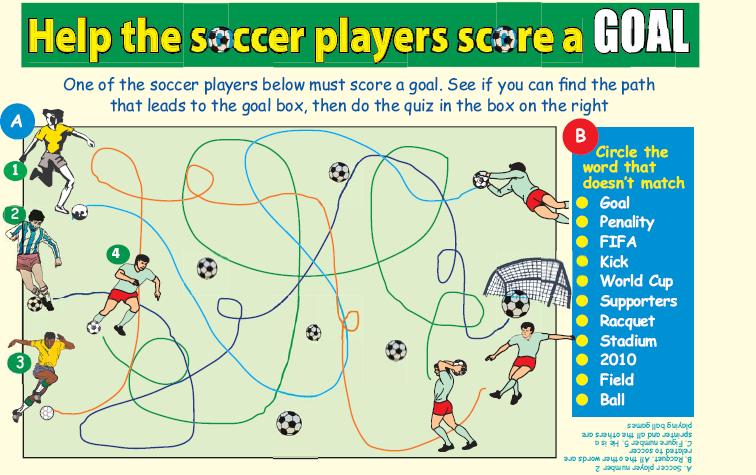
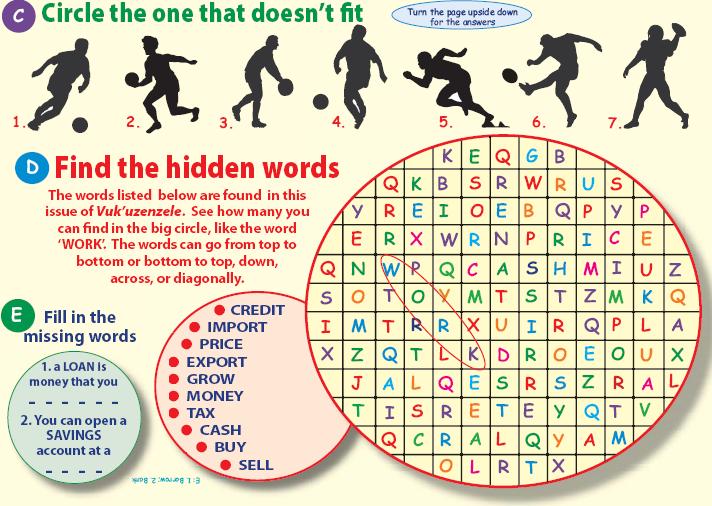
HEALTH ADVICE: STAYING ACTIVE IN OLD AGE
HEALTH ADVICE: STAYING ACTIVE IN OLD AGE sadmin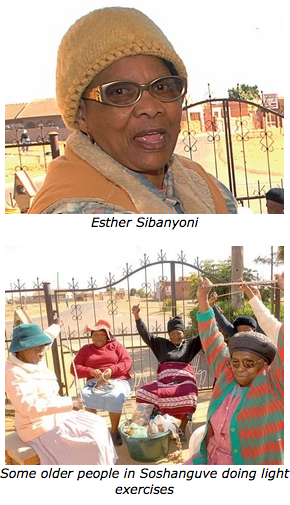 On Tuesdays, house number 1757 in Block G Soshanguve, north of Pretoria can be mistaken for a pension payout point.
On Tuesdays, house number 1757 in Block G Soshanguve, north of Pretoria can be mistaken for a pension payout point.
Grandmothers are seen packed in the garage and in the yard knitting or making different products. They sometimes take a break to do light exercises.
This is Esther Sibanyoni’s house. Sibanyoni, a retired librarian and a nurse, is 70 years old, but she looks like a woman in her 50s
Community Builder
As a community builder who has won several awards, Sibanyoni shares her knowledge and skills with fellow older persons on how to stay healthy and make a living.
The energetic and positive Sibanyoni has 50 members in her Soshanguve Care for the Aged project. She showed Vuk’uzenzele the products they make and the exercises they do to stay fit using waste material like empty plastic bottles.
Sibanyoni is known for other community projects that won her awards like the Sowetan /Old Mutual Community Builder of the Year award and the Shoprite/Checkers SABC3 Woman of the Year award.
Sharing skills
Sibanyoni started the old-age project in August 2006 after realising that many grandmothers used their pension money for medicine to treat diseases that could be prevented.
“I started with about eight grannies sharing skills like knitting and health tips. Most of them suffered from diseases like tuberculosis, arthritis, or diabetes. As a retired nurse, I know some of these diseases are caused by ageing and bad diet,” she said.
Today the grannies follow healthy diets and earn an income. They make products like cushions, hats, gloves, shoes, sheets, scarves and baby clothes, using waste material collected from factories and dressmakers.
The products are sold to the community.
- Ndivhuwo Khangale
26 to 30 September 2007 is Older Person’s Awareness Week. During this time, the Department of Health will educate older people and the public about how to take care of the aged and age-related matters.
- Eat boiled food rather than fried foods.
- Avoid using cooking oil; rather use olive oil.
- Do not eat too much salt, sugar, sweet fruits or white bread.
- Do light exercises or walk around the yard every morning. It helps to improve blood circulation.
- If you drop something on the floor, slowly bend down and pick it up. It helps support the spine.
- Train your eyes by swinging a tennis ball or something else in front of your eyes.
- Find useful things to do like community work or light housework.
Vuk'uzenzele Health Advice
GCIS
Private Bag X745
Pretoria, 0001
E-mail us on: vukuzenzele@gcis.gov.za
The Department of Health will advise you.
CANCER: WHAT YOU SHOULD KNOW
What is breast cancer?
Breast cancer is an uncontrolled growth of breast cells. Cancer has the potential to break through normal breast tissue barriers and spread to other parts of the body.
What causes breast cancer?
While cancer is always caused by a genetic “abnormality” (a “mistake” in the genetic material), only 5 – 10% of cancers are inherited from your mother or father. Instead, 90% of breast cancers are due to genetic abnormalities that happen as a result of the aging process and life in general.
Signs and symptoms of breast cancer
Breast cancer symptoms vary widely – from lumps to swelling to skin changes. Many breast cancers have no obvious symptoms at all. Symptoms that are similar to those of breast cancer may be the result of non-cancerous conditions like in-fections or a cyst.
How can breast cancer be prevented?
While there are things every woman can do to help her body stay as healthy as possible (such as eating a balanced diet, not smoking, minimizing stress, and exercising regularly), breast cancer is never anyone’s fault. Feeling guilty, or thinking that breast cancer happened because of something you or anyone else did, serves no purpose.
Self-examination for breast cancer
Breast self-examination should be part of your monthly health-care routine, and you should visit your doctor if you experience breast changes. If you’re over 40 or at a high risk of getting the disease, you should also have an annual mammogram and physical examination by a doctor.
Cervical cancer
Cervical cancer is the second most common cancer in women, and is one of the most preventable forms of cancer..
What is cervical cancer?
The cervix, or mouth of the womb, can develop cancer. All women should have a pap smear at least once every 10 years to detect cancer cells.
A pap smear is a simple, painless procedure that is done during a vaginal examination at a health clinic or a doctor’s office. Some cells are gently wiped off the cervix and sent to the laboratory for testing.
What causes cervical cancer?
Most cervical cancers (99%) are linked to genital infection with the Human Papilloma Virus (HPV) which is transmitted through sexual intercourse, especially if you have many sex partners
Signs and symptoms of cervical cancer
Generally there are no signs until cervical cancer has progressed. Bleeding may start and stop between menstrual periods, or it may occur after sexual intercourse. Menstrual bleeding may last longer and be heavier than usual. Increased vaginal discharge can be another sign of cervical cancer.
How can cervical cancer be prevented?
Cervical cancer can be prevented by: avoiding HPV infection through using condoms; avoiding multiple sex partners; postponing early sexual intercourse until older; not smoking cigarettes.
Breast cancer is the most common cancer found in women. The earlier breast cancer is found and diagnosed, the better your chances of beating it
A regular pap smear can detect cervical cancer. The earlier it is diagnosed, the greater the chance of it being successfully treated.
KEEPING IT BRIEF
KEEPING IT BRIEF sadmin|
Protecting African culture Suggestions relating to the protection of African culture were received from the public during meetings held countrywide. The end result will be a draft Heritage Transformation Charter to be published in October. The draft charter will be presented to the Department of Arts and Culture. Some of the recommendations will ensure that: - Access to heritage sites will be affordable for all South Africans. - BuaNews |
|
Northern Cape The provincial health department started a programme called Care for the Carer in Langly near Kimberly. The programme aims to develop and promote support for people who offer home-based care, as well as voluntary counselling and testing (VCT) programmes for people living with or affected by HIV and AIDS and other chronic illnesses. It will benefit about 700 home-based carers, 380 VCT counsellors and 22 peer educators, as well as NGOs from all five districts. - BuaNews |
|
|
|
Mpumalanga To help the province manage low-cost housing projects, an additional 93 community development workers will be appointed. The additional workers will bring the total number to 420. They will keep waiting lists up to date and will contact housing beneficiaries to tell them when their houses will be ready. They will also help municipalities to find households affected by disasters and in need of emergency help. - BuaNews |
|
|
|
Limpopo The provincial department of local government and housing is completing low-cost houses that were left unfinished by some contractors in Pienaarsrivier near Bela-Bela. The department has put aside R331 million to complete 8 495 unfinished units across the province. More than 500 units have already been completed in Blouberg, Modimolle and Pienaarsrivier. All the outstanding units are expected to be com-pleted by the end of March next year. - BuaNews |
|
|
|
KwaZulu-Natal The province's Department of Education has adopted a plan that will turn schools into centres where care and support is also offered. The plan, called Inclusive Schools, aims to remove barriers to teaching and learning. These are lack of facilities at schools and poverty. They also include the plight of homeless children, HIV and Aids and other health problems, lack of teacher support and social or psychological problems. - BuaNews |
|
|
|
Eastern Cape The signing of a memorandum of understanding, will speed up the building of 20 000 houses in the Zanemvula Human Settlement project in Port Elizabeth. Almost 20 000 houses will be built for about 100 000 people, making this the biggest housing project in the Eastern Cape. It will give relief and housing security to people living in informal settlements in the flood plains. - BuaNews |
|
|
|
North West An Adult Basic Education and Training (ABET) programme started by the province's Department of Social Development, will teach adult employees about things like career development. It is for low-level workers who cannot read, write and count well. The programme includes training in language, literacy and communication; maths and mathematical sciences; natural science; arts and culture and technology. - BuaNews |
|
|
|
Free State At least 21 engineers have been sent to various municipalities countrywide in an effort to get rid of the bucket system in formal settlements. Seven of the engineers were sent to the Free State because of the serious backlog in the province. The Free State accounts for - BuaNews |
LETTERS TO THE EDITOR GIVE US A PIECE OF YOUR MIND
LETTERS TO THE EDITOR GIVE US A PIECE OF YOUR MIND sadmin WINNING LETTER
WINNING LETTER
A life of crime is not worthwhile
I am a concerned teenager because our youth is so easily tempted by crime. We see people driving nice cars, wearing smart clothes and living fancy lives and we want to be in their shoes. But it’s no use wanting to live like them when we don’t know how they got there. We end up taking short cuts in life just to live the fast life, but these are the things that mislead us. Speed kills. Guys, we have a great future lying ahead of us. There is no rush.
Good things come to those who wait and your time is coming. There are lots of opportunities and if you work hard anything can be achieved. It is okay to dream big. Your dreams can come true if you believe in yourself, have a plan and don’t leave your education behind. Please remember that a life of crime is just not worthwhile.
- SM Ziqubu, Durban, KwaZulu-Natal
Alcohol is not a solution
Thanks for writing about the dangers of alcohol abuse. How many people have not died unnecessarily on our roads due to drunk drivers? How many young people turn to alcohol because it seems “fashionable”? Brothers and sisters, alcohol is NOT a solution to your problems. Alcohol abuse is not fashionable at all! You don’t need alcohol in your body to solve any problems.
- Charles Pule Siwendi, Sebokeng, Gauteng.
Seek help for alcoholism
The most devastating thing about alcoholism is that it affects family and friends as much as the alcoholic. It is commonly accepted that every alcoholic affects at least 16 other people’s lives -whether they are family, friends or colleagues at work. The sad thing is that many people living with alcoholism are not aware that help is available from organisations like Al-Anon and AA in South Africa. So, if someone’s drinking is a concern to you, seek help right now!
- Thulo Tshowane, Windsor East,Gauteng
Take pride in our anthem
I am concerned about our country’s people. If you watch TV you’ll see that in countries like Britain, the USA, France and Australia, people are passionate about their national anthem and they respect it. When you watch soccer in South Africa, some people smoke, drink or sit down and talk when the anthem is playing. It is time we teach our people the importance of our anthem and to take pride in it; we fought for it to be changed, now we’re the ones who don’t respect our very own national anthem.
- NTR, Cradock, Eastern Cape
We need ubuntu
South Africans have been through many difficult situations in the past, irrespective of race or gender. Nowadays life is better for most, but there are still those suffering because of poverty, HIV and Aids, crime, unemployment and other difficult situations.
We need “ubuntu” to fight all these negative things. Let’s all take part in the fight by uniting, caring and loving one another, so that the whole world may see the beautiful rainbow nation.
- Frans Motlau, Soshanguve, Gauteng
To eat, you must work
To eradicate poverty, you must first swallow your pride. Since the introduction of RDP, people are no longer willing to work. All they want are free things! Take action, sisters and brothers. Before you eat, you must first work. Don’t fold your hands and wait for government. You will reap what you sow.
- Maselokela Mashita, Seshego, Limpopo
2010 - our time is now
It is time for us as South Africans to wake up and do it for ourselves before we lose the opportunities ahead. Remember the Sotho proverb "kwekwe ya morao a tloha le sepolo", which means do things in time or lose the opportunity. So our time to prepare for 2010 is now. Let us prove to other nations that Africa can and will, because 2010 is a golden opportunity, not only for South Africa, but for the whole African continent.
- Selhaba Makafu, Bethlehem, Free State
Aim high, dream big
Taking responsibility for your own future and fighting to succeed isn't an easy road. But I say, please whatever the challenges you face, never quit. The life we want isn't going to fall from the sky right into our laps unless we work hard and make things happen. I want to say:
Life is a gift, accept it;
Life is a duty, perform it;
Life is a journey, complete it;
Life is a promise fulfil it.
So, never quit, aim high, dream big.
-Gloria Napo, Tafelkop, Limpopo
Ex-convicts fight crime
Being in prison doesn't mean nothing will come out of you. I am an ex-convict who is fighting crime by conducting crime prevention awareness programmes.
To all ex-convicts out there, let's help the nation with strong and sustained community interventions focused on crime prevention. The nation needs your help as well as your experience. Inmates, come together and form focus groups against crime. We are trained in different skills, let's use them and get a life!
- Mncedisi Pole, Alice, Eastern Cape
Making life easier
Thank you for an accessible magazine as a resource at the disposal of South Africans to make their lives easier.
I am a 20-year old man making the best of my poor background. I am using the little I have to improve my chances of succeeding in this big, bad world. Life has really been a lesson to me, and I am surviving!
We do not choose what happens to us, but we have control over what lies ahead. Problems and challenges will come, but be a victor, not a victim or a coward.
- Tshepo Gaerupe, Ganyesa, North West
Educate yourselves
I am a 29-year old, jobless woman with two kids to feed. When I read Sifiso Kumalo's letter, I felt a bit more motivated. Thank you Vuk'uzenzele for making me not lose hope. I do believe one day I will get a job and be able to feed my children. But I want to tell other Vuk'uzenzele readers not to start by having babies, but to educate themselves first and then get good jobs.
- Rose M Phosholi, Soweto

Write to: Vuk'uzenzele, Private Bag X745, Pretoria, 0001,
or e-mail: vukuzenzele@gcis.gov.za.
If you don't want to have your real name published, you may use a different name,
but please include your real name and address to us.
NEW CREDIT ACT
NEW CREDIT ACT sadminYOU CAN GET A JOB IF YOU ARE BLACKLISTED
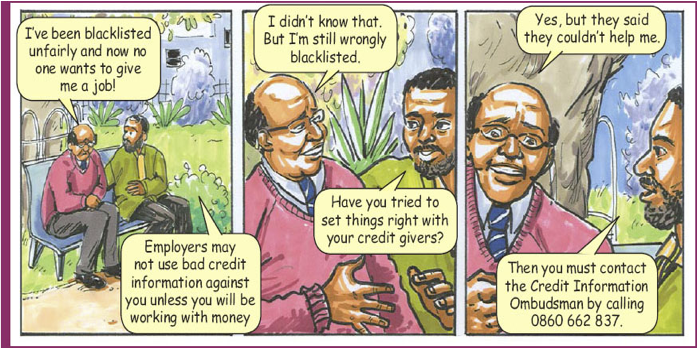
Being blacklisted is a disappointment to anyone. Not getting a job because of it is a double disappointment. Musa discovered how difficult it was to find a job after being blacklisted. He believed he was unfairly blacklisted and contacted the credit-giver, but they couldn’t help him. He then contacted the Credit Information Ombudsman.
In line with the new National Credit Act, credit information of people who had been blacklisted for failing to pay debts of less than R500 have been removed from the credit bureau on 1 June this year.
Couldn’t pay
In 2004, Musa had a car accident. He was in hospital for four months fighting for his life. During this time, his employer didn’t pay him, so he couldn’t pay his debts. He was also unable to make arrangements with his credit givers. They thought he had disappeared and reported him to the credit bureau. When Musa got out of hospital, he tried to find a job, but it was very difficult. Even with a good CV and reference from his last employer, most employers told Musa they couldn’t give him a job because he was blacklisted.
Good news
But Credit Information Ombudsman, Manie van Schalkwyk, had good news. In line with the new National Credit Act, your bad credit information at the credit bureau may not be used against you when you apply for a job. The only time this information may be used against you is when you apply for a job involving working with money and where the utmost trust and honesty is required. But the employer must have your permission to get the information from the credit bureau.
The Act also says that credit givers must give people 20 working days before they can be blacklisted at the credit bureau.
Credit report
With the new Act, consumers can ask for a free credit report from the credit bureau at least once a year. If you believe you were wrongly or unfairly blacklisted, you must first try to put the matter right with the credit providers and the credit bureau. If this doesn’t work, you can contact the Ombudsman by calling 0860 662 837 for free. If you have access to the Internet, you can e-mail the ombudsman at ombud@creditombud.org.za, or visit the website at www.creditombud.org.za for more information. - Ndivhuwo Khangale
- Ndivhuwo Khangale
If you have been unable to find a job because you are blacklisted, the new National Credit Act brings good news. In line with the new Act, bad credit information at credit bureaus may not be used against you when you apply for a job unless you will be working with money. The new Act came into effect on 1 June, 2007.
For more information on the New
National Credit Act, call the Credit
Information Ombudsman on
086 166 28370
NICRO: SUPPORTING FORMER OFFENDERS
NICRO: SUPPORTING FORMER OFFENDERS sadmin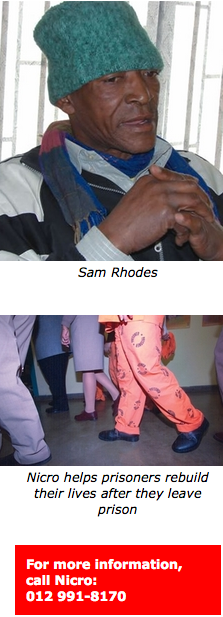 Support for ex-prisoners and crime survivors
Support for ex-prisoners and crime survivors
One of the reasons many ex-prisoners go back to jail after being released, is that they feel they are not welcome back in society. After leaving prison, most of them find themselves without jobs and homes. Many are rejected by their families and communities.
This makes them want to go back to jail where they “have life”, said Sam Rhodes, a former prisoner from the Cape Flats.
All the days combined that Rhodes spent outside prison between 1962 and 1998, are less than a year.
Changed his life
"I was surprised when I was released in 1998 to find a new South Africa without racial discrimination," he said.
Thanks to the National Institute for Crime Prevention and the Re-integration of Offenders (Nicro), Rhodes decided to change his life in 1998.
Nicro is a countrywide, non-profit organisation that helps ex-prisoners to re-build their lives after they leave prison. They offer support, empowerment and skills development to prisoners, ex-prisoners, crime victims and the youth. Their projects include re-integrating offenders into communities, supporting victims of crime, youth development programmes and economic opportunities.
Social workers
As part of the Offender Re-integration Programme, social workers go to prisons to prepare prisoners to face the community after being released.
The social workers find out which skills the prisoners got in jail. They then encourage them to join one of Nicro's programmes to help them make a living outside prison.
Families of prisoners also get advice on how to support them and make them feel wanted when they get out of prison, she said.
Victim support
Nicro's Victim Support Programme helps victims and witnesses of crimes to deal with the situation. They help with counselling, opening a case with the police, and court procedures.
The Youth Programme gives young offenders life-skills that help them to take responsibility for their lives and turn away from crime.
The Economic Opportunities Project helps those who want to start small businesses. They get training in business and life-skills, tender procedures and budgeting. Nicro also helps them find sponsors and jobs.
It is through the Economic Opportunities Project that Rhodes took charge of his life and started a small business. He now runs a successful sweet shop from his father's house in Gugulethu.
"The Nicro programme changed my mindset," he said. "It taught me to be responsible for my actions and I began to see life differently."
- Ndivhuwo Khangale
ROLE MODEL
ROLE MODEL sadmin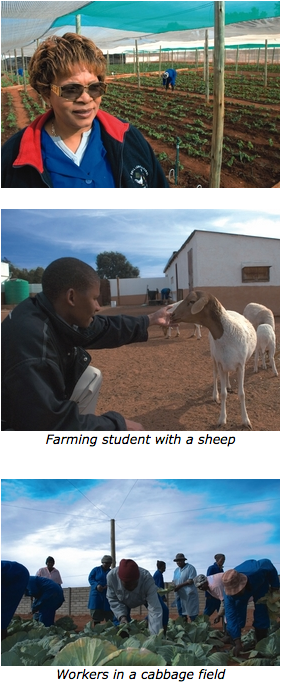 TRAINING FUTURE FARMERS TO FEND FOR THEMSELVES
TRAINING FUTURE FARMERS TO FEND FOR THEMSELVES
The soil we walk on, spit on and often disrespect, is a giver of life. This is Sabina Koza's key message when she teaches students how to farm, grow vegetables and sell their products to earn a living.
Braving the winter cold, students gather around "Mama" Khoza every morning to learn about farming. Students from different areas in and around Soweto attend Sabina Khoza's small farming school in Zuurbekom. The students, who are mostly from poor families, are trained free of charge.
So far, 1 147 future farmers have graduated from the school, which is called Fair Deal Training Centre. Its motto is "Education with Production."
Food and shelter
Nominated for this year's community builder of the year award, Khoza said she started farming by mistake.
Khoza, who comes from Mfolo in Soweto, says with democracy in South Africa came the freedom to buy land anywhere in the country. When she bought the small farm near Soweto, three families lived there. She couldn't chase them away because of her religious beliefs. The challenge was to ensure that they had food and shelter.
"I had no farming background. I am just a township girl with some experience as a furniture sales lady. I wondered how on earth I was going to help these poor souls in my yard," she said.
Chicken farming
But the "poor souls" in her yard told her that the soil would take care of all of them. So she went to the Westonaria local municipal offices and got information on how to start a farm. Someone with knowledge of farming from the local government was sent to help her.
Khoza started with chicken farming. They later grew vegetables, which they sold at the market and in Soweto.
Fighting poverty
Realising that she could use her new skills to help fight poverty in the community, Khoza decided to open a farming school. "I teach people to fend for themselves," she said. The forty-day basic training course includes subjects like plant production, weed and pest control, soil preparation and fertilisation, poultry production, crop diseases and choosing the right tools.
By teaching farming skills to disadvantaged students, Khoza is helping government to reach its target of halving poverty by 2014. Because many of the graduates are women and young people of school-going age, she is also helping to empower women and to create an interest in farming among the youth.
- Muzi Mkhwanazi
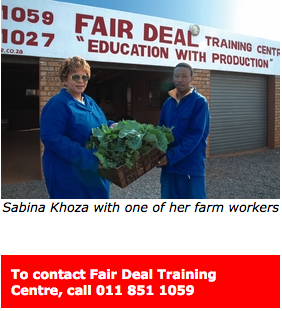
SKILLS DEVELOPMENT
SKILLS DEVELOPMENT sadmin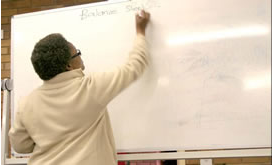 HELPING YOU TO BECOME A TEACHER
HELPING YOU TO BECOME A TEACHER
There is a shortage of trained teachers in South Africa, especially for subjects like maths and science. One way government is encouraging young people to study teaching is by giving them bursaries.
The Fundza Lushaka Bursary Programme gives preference to students from rural areas and to those who want to train in priority subjects where teachers are scarce. These include mathematics, science, technology, English and other South African languages, as well as teaching in the lower grades. This year, about 3 000 students got bursaries. In 2008, even more will be available.
Government schools
The programme gives bursaries to students studying for a BA degree in Education or a postgraduate Certificate in Education. It will also give bursaries to students who are in their final year of a straight BA degree with one of the scarce subjects as a major, and who plan to register for a Postgraduate Certificate in Education.
The bursaries are not for students studying for the Advanced Certificate in Education.
Students studying through Fundza Lushaka must teach at a government school in their province when they complete their studies. They also have to teach for the number of years they have received the bursary
Students who received their bursaries for four years of study, must teach at government schools for four years. After that, they may choose other schools.Students who fail their studies, or do not teach at government schools, or leave a teaching post before the end of the agreed service period, must pay back the money.Students who already have other bursaries may give up these bursaries or take a reduced Fundza Lushaka bursary.
Expenses
A Fundza Lushaka bursary pays for all the student’s main expenses. These include course fees, accommodation, books, and monthly living expenses.
How to apply
To get a Fundza Lushaka bursary, you must meet the college or university’s admission criteria, as well as the Fundza Lushaka bursary selection criteria.
To find out more or to get an application form, contact your nearest college or university and ask for the National Student Financial Aid Scheme.
- Ndivhuwo Khangale
Do you want to become a teacher and work for a government school? If you are from a rural area and want to teach, the Fundza Lushaka Bursary Programme is for you. It was started this year to encourage young people to study teaching.
For more information, contact the Department of Education 080 020 2933 or call 1020.
SOCIAL COHESION IN ACTION
SOCIAL COHESION IN ACTION sadmin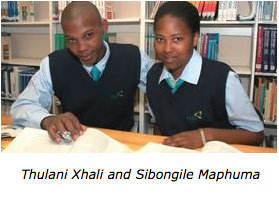 ALICEDALE, A MODEL FOR SOUTH AFRICA
ALICEDALE, A MODEL FOR SOUTH AFRICA
HARD-WORKING, HUMBLE AND ALMOST CRIME-FREE
The people of Alicedale, a small village in the Eastern Cape, are friendly, humble and hard working. Many are poor, but for them poverty is no excuse for doing crime. They live in an almost crime free community.
Alicedale Police Station Commander, Mthetho Qinga, said there are just about no incidents of serious crime in the area. “Murder, rape, hijacking and armed robberies are very rare. I can’t remember when last we had a murder case. Even minor crimes like stock theft and assaults are unusual in Alicedale,” he said. “In one month we sometimes have one or two cases of stock theft or assault and at times no incidents are reported at all,” he added.
The low crime rate is a result of police efforts and the improved economic situation in the area, as well as the positive attitude of the people.
Alicedale is a model for other communities to follow. It is a shining example of government’s call for social cohesion. It is a place where people of all races work hand in hand to improve their lives. The partnership between government and a privately owned hotel group in Alicedale also shows how government and the private sector can work together to create better lives for all.
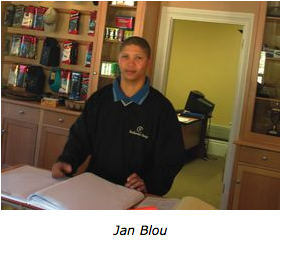 BURSARIES FOR FUTURE HOSPITALITY MANAGERS
BURSARIES FOR FUTURE HOSPITALITY MANAGERS
Thulani Xhali and Sibongile Maphuma are proud recipients of the Mantis Collection bursaries to study for a three-year BCom degree in Hospitality Management. The Mantis Collection Group, who sponsor the bursaries, own the Bushman Sands Hotel in Alicedale. The company has invested a lot of money in skills development and job creation for local residents. The two students are the first of 12 who are part of the bursary programme started by the Educational Institute for Services Studies based in Port Alfred.
FROM UNEMPLOYED RUGBY PLAYER TO MANAGER
The life of Jan Blou, a former rugby player for the Eastern Province, was almost destroyed after his contract with the team ended in 2001. Left unemployed, the 27-year-old Alicedale resident had no job skills and was facing a life of poverty.
Blou saw his salvation in the local hotel, where the majority of people in Alicedale work. He attended a game-ranging training course there, but failed his driver’s license, which was part of the course.
Blou said he almost lost hope, but an old man who worked at the hotel encouraged him to find a job as a gardener. From there he could improve his skills.
“While working as a gardener, I applied for a job as a porter, but didn’t get it. Instead, I was offered a job as a shop assistant at the hotel’s golf shop,” he said. Blou did so well that he was promoted to shop manager last year. “I never thought something good could happen to me or to Alicedale,” he said. “But with the hotel being here, there have been a lot of positive changes and the future looks very bright,” he said.
“Anything is possible in Alicedale now,” said the former rugby player and gardener, turned shop
manager.
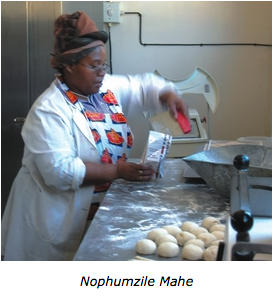 BAKING THEIR DAILY BREAD
BAKING THEIR DAILY BREAD
Many people in Alicedale work in the hotel industry, but there are also those who realise that a hotel cannot give jobs to everyone.
“The hotel industry brings much-needed business opportunities, but it is not manna from heaven,” said, Nophumzile Mahe.
Mahe and 23 other women in the area decided to start a bakery in the town because there wasn’t one in the area. They hoped that the hotel would order bread and cakes from them.
After they worked out a business plan, they got money from the Eastern Cape social development department to start the business. “We now have bread in abundance,” said Mahe. She said shops in the town now rely on them for their daily bread. Their target is to get a government contract to supply bread to local schools.
“We have also talked to the hotel and they said they would think about using us to provide bread for their customers,” Mahe said.
NEW DEVELOPMENTS, NEW JOBS
In 1994, just before the railway line in Alicedale closed down, many jobs were cut. Brian Mbulelo Matthews, who was a railway policeman, was one of those who lost his job. Even though he was trained in a number of skills, he couldn’t find permanent work. Uncertain about his future, Matthews only got some “piece jobs”.
Remembering the years after the closure of the railway line, Matthews said Alicedale experienced extreme poverty.
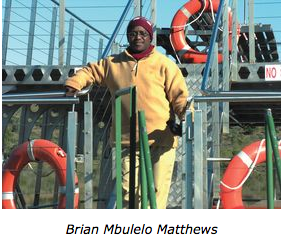 But when the Bushman Sands Hotel was built in 2003, there was new hope for the community. Jobs were created and people got free skills training.
But when the Bushman Sands Hotel was built in 2003, there was new hope for the community. Jobs were created and people got free skills training.
“They helped me to train as a game ranger. I also learned to steer a boat and drive a vehicle,” said Matthews, who is now helping to transport guests.
A lot of new developments, like golf estates, are expected to take place in the area. This will create even more jobs.
A new golf estate project is already offering jobs in building and construction. “As a community we are all benefiting from the developments which have started since the hotel was built,” Matthews said.
- Stories by Muzi Mkhwanazi
SPECIAL FOCUS: ECONOMY LITERACY
SPECIAL FOCUS: ECONOMY LITERACY sadmin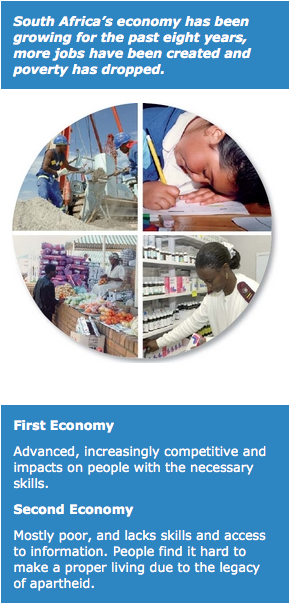 UNDERSTANDING THE ECONOMY
UNDERSTANDING THE ECONOMY
For the past eight years, our economy has been growing constantly, more jobs have been created and poverty has dropped. This was found by a study of the Policy Co-ordination and Advisory Services (PCAS) in the Office of the President.
The study also found that the country is likely to meet the targets of the Accelerated and Shared Growth Initiative for South Africa. These targets include halving unemployment, creating jobs and growing the economy by six per cent by 2014.
Why do a study?
Just like we have to manage our money and make it grow to improve our families’ lives, our government also has to manage its finances to improve the lives of the country’s people.
The PCAS study was done to find out if government is reaching its targets of growing the economy and putting into practice its social and development programmes. It gives government a broad picture of its overall progress and the challenges it faces. This helps government to plan better and improve its performance to benefit the people.
The study was done in line with 10 broad themes. These included economic growth and transformation, employment trends, poverty and inequality, health, education and social cohesion.
Findings
Some highlights and challenges:
- Black participation in the economy has improved, but it needs to grow even more.
- More black people have moved from the Second to the First Economy since 2000.
- The number of people earning less than R3 000 per year has dropped from 50 per cent to 43 per cent.
- Since 1994, about 2,3 million houses that are financially supported by government have been completed or are in progress.
- A total of 85 per cent (9,5 million) of households have access to water.
- About 71 per cent (9 million) of households have access to sanitation (toilet facilities).
- About 9,5 million households had access to electricity in 2006, compared to 4,4 million in 1995.
- Cases of TB increased since 2001 and drug-resistant TB has appeared.
- The number of matric learners passing higher-grade maths has grown from 19 504 in 2001 to 33 112 in 2006.
- Adult literacy has grown from 69,6 per cent in 1995 to 74,2 per cent in 2005.
- Tourism has been growing fast since 1994. This is helping to create more jobs.
- South Africa is now among the top six countries regarding openness in budgeting.
- Most people are happy and confident about the country’s future.
- Ndivhuwo Khangale
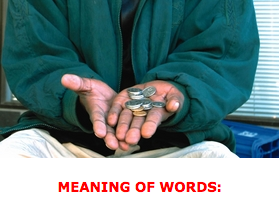 EARNING YOUR MONEY. ..MANAGING IT WISELY
EARNING YOUR MONEY. ..MANAGING IT WISELY
Economy is about working and doing business to earn money. It is also about how we manage and use the money to buy goods and services. When people are buying a lot and businesses are getting richer, the economy is said to be good.
There is no limit to the things people want, but the money to buy those things is usually limited.
If every household in the country could produce every-thing they wanted, our lives would be much simpler. But all of us need to buy things or services from each other.
To do this, we have to earn an income. A doctor, for example, earns money by treating patients. If there’s a leaking water pipe in the house, the doctor would pay a plumber to fix it. If food is needed it will be bought from the grocery shop. Even people in the informal economy, like street sellers, sell and buy among each other.
Managing money
Economy is all about earning money and how we use and manage our money to buy goods and services.
Managing your money means using it wisely. The amount of money you earn, for example, will help you pay for your basic needs like food, housing and clothing. If there is money left, you can spend it on non-basic items like a TV set or a car. Or you can open a savings account at a bank to save money for your children’s education or your retirement.
All of us need to buy services and goods. To do this, we have to earn an income and use it wisely
Based on your earnings and future earnings, you can also spend money before you actually have it. It means you can buy things on credit by borrowing money from the bank or shop where you buy the product. But to get credit, you must prove that you will be able to pay back the money over an agreed period of time. Most people who buy a house or a new car can only afford it on credit.
Credit makes it easier to buy things, but it is more expensive, because you have to pay interest on the money you borrow.
Taxes
Just like you have to earn and manage your money, government also has to earn money and use it wisely. Government is responsible for growing the country’s economy and improving the general standard of living of the people. A large share of our country’s money comes from the taxes we pay and from exporting products to other countries. Exports include gold, iron, steel, coal, fruit, fish and vegetables.
Budget
To help government decide how best to spend the country’s money, a budget is drawn up every year.
The Expanded Public Works Programme is an example of how government spends money to help people to get jobs and skills. This reduces unemployment and poverty.
Tax money is used for things like healthcare, education, housing, roads, railways, harbours, and safety and security. These things help to create a better life for all South Africans.
-Muzi Mkhwanazi
Cash flow : The amount of money a person has left after paying basic expenses like rent, food and school fees
Credit: Money that you borrow and pay off over an agreed period of time
Export: To sell goods or services to a buyer in another country
Import: To buy goods and services from another country Inflation: A continuous rise in the level of prices of goods due to different factors in the economy
Inflation: A continuous rise in the level of prices of goods due to different factors in the economy
Informal economy: A large, growing part of the economy where poor people make a living outside the world of full-time employment
Interest rate: The amount that is charged for borrowing money The amount of money that one pays to a borrower, like a bank, for the use of the borrowed money given as a percentage Investment: Money put into projects or property with the expectation of making it grow
Micro: Very small
Taxes: Money collected by government from people or businesses for use in public spending like health, education, transport and housing he study also found that the country is likely to meet the targets of the Accelerated and Shared Growth Initiative for South Africa. These targets include halving unemployment, creating jobs and growing the economy by six per cent by 2014.
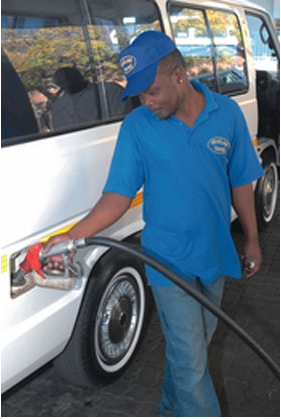 WHAT IS THE MICRO ECONOMY?
WHAT IS THE MICRO ECONOMY?
The economic activities between you and your bank, or between you and someone who provides a service, like a doctor or a plumber, are at the micro level of the economy. This means they are small economic activities.
Inflation
Even though micro-economic activities are small, they are an important part of the country’s overall economic performance. If we buy too much on credit, the prices of goods go up, which is one of the things that cause inflation.
Government then steps in and raises the interest rate. This means we pay more interest on borrowed money. It should encourage us to use less credit and buy only what we can really afford.
Oil price
Government also gets involved in micro-economic issues when the prices of goods we import from other countries, go up or down.
When the oil price goes up, for example, it affects the country’s economy.
South Africa does not produce oil, but buys it from oil-producing countries. Petrol is a product of oil, so when those countries raise the oil price, our government has to raise the petrol price in South Africa. The petrol price influences the prices of many other things, because petrol is used to transport goods and people.
To buy oil, government has to use foreign money like dollars.
Some ways in which the country earns foreign money, is from export duties and foreign investments. If we do not have enough foreign money, government cannot protect us from price increases.
-Muzi Mkhwanazi
For more information on how to manage your money wisely or open a savings account, you can go to your nearest bank, or call 1020
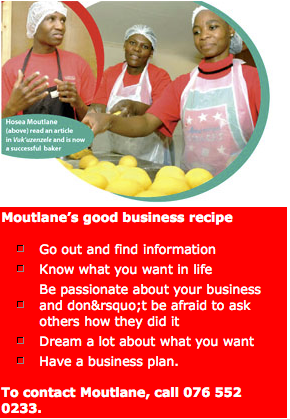 A SECOND ECONOMY SUCCESS
A SECOND ECONOMY SUCCESS
Hosea went from unemployment to independence
Eleven years ago, Hosea Moutlane was just a youngster thinking about his future in the dusty streets of a small village outside Polokwane in Limpopo. He had passed his matric, but didn’t have money for further studies.
Moutlane found a job as a security guard in Lephalale (previously Ellisras), but this was not really what he wanted to do. When he later got a job as assistant to a baker, he became interested in baking as a career.
Business plan
In 2006, Moutlane visited the Lephalale Community Library where he found a copy of Vuk’uzenzele. A story in the magazine about how to draft a business plan caught his attention. This, and a competition he saw in the local newspaper, changed his life forever.
The Limpopo Youth Buzz Competition, run by the Provincial Department of Economic Development, called for the youth to draft a business plan. Aimed especially at previously disadvantaged youths and those who wanted to start businesses, it was a golden opportunity for Moutlane to get his own bakery going. Using the tips he saw in Vuk’uzenzele, Moutlane drafted a business plan.
A winner
His efforts paid off and he was called to present his plan. Chosen as one of five winners, his prize was R192 000 worth of equipment to start a bakery.
The department also helped him with training in business skills like financial management, tendering skills, book-keeping, business management and life skills.
He found space for a business in Modimolle (previously Nylstroom) and started his bakery in February this year. Six people from the local community are working for him.
“We bake things like bread, bread rolls, rusks and cakes. We sell to the community and deliver to different shops,” he said.
The business is doing much better than Moutlane ever thought it would. “It is the only bakery in the area and a lot of people buy here. We can hardly keep up with the demand,” said the successful young businessman.
Bread for the needy
“This business has taught me to be responsible and take care of other people. I give bread to the needy every Friday and some come here every day. I also buy newspapers and magazines so those who don’t have access to information can read them for free at the bakery,” he said.
-Ndivhuwo Khangale
THE GUARDIAN FUND
THE GUARDIAN FUND sadmin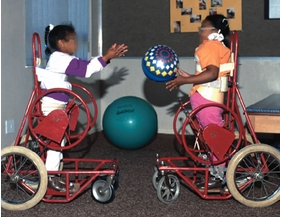 PROTECTOR AGAINST ECONOMIC HARM
PROTECTOR AGAINST ECONOMIC HARM
What is the Guardian Fund?
The Guardian Fund was started to manage funds on behalf of those who cannot do it themselves. For example a mentally ill person who inherited a large sum of money, or the money of young children, unborn heirs, or missing persons.
Who manages the Guardian Fund?
The Master of the High Court in the different provinces is in charge of the Guardian Fund. This means that claims in KwaZulu-Natal, for example, will be handled by the KwaZulu-Natal Provincial Division of the High Court and claims from Gauteng will be handled by the Witwatersrand Division of the High Court.
When does money go to the Guardian Fund?
If the parents or guardians of children or people who cannot look after their own money die without leaving a will, the money they leave behind will be paid into the Guardian Fund. The money is invested with the Public Investment Commission where it grows by earning interest for the beneficiaries. The Guardian Fund does not charge fees like private fund holders.
Can guardians or relatives of minor children claim the money?
If the parents of minor children (younger than 21) have died, the people who are responsible for the children, like relatives or a guardian, can apply for maintenance money from the fund. People who claim must be able to prove that they are responsible for raising the children. They must also give full details of the child’s expenses.
What expenses can the money be used for?
If the parents of minor children (younger than 21) have died, the people who are responsible for the children, like relatives or a guardian, can apply for maintenance money from the fund. People who claim must be able to prove that they are responsible for raising the children. They must also give full details of the child’s expenses.
What happens when the child becomes a major?
When the child becomes a major at the age of 21 and there is some money left in the fund, the child can apply to have the money paid directly to him or her.
- Muzi Mkhwanazi
Our government is the protector of all the country‘s people. One of the main ways of protecting them against harm is through the police and army. But government must also protect people against economic harm. This means those who are unable to manage their own money, like children or mentally ill people, must be safeguarded against misuse of their money. One of the ways to do this is through the Guardian Fund.
THE POLICE NEED YOUR HELP
THE POLICE NEED YOUR HELP sadmin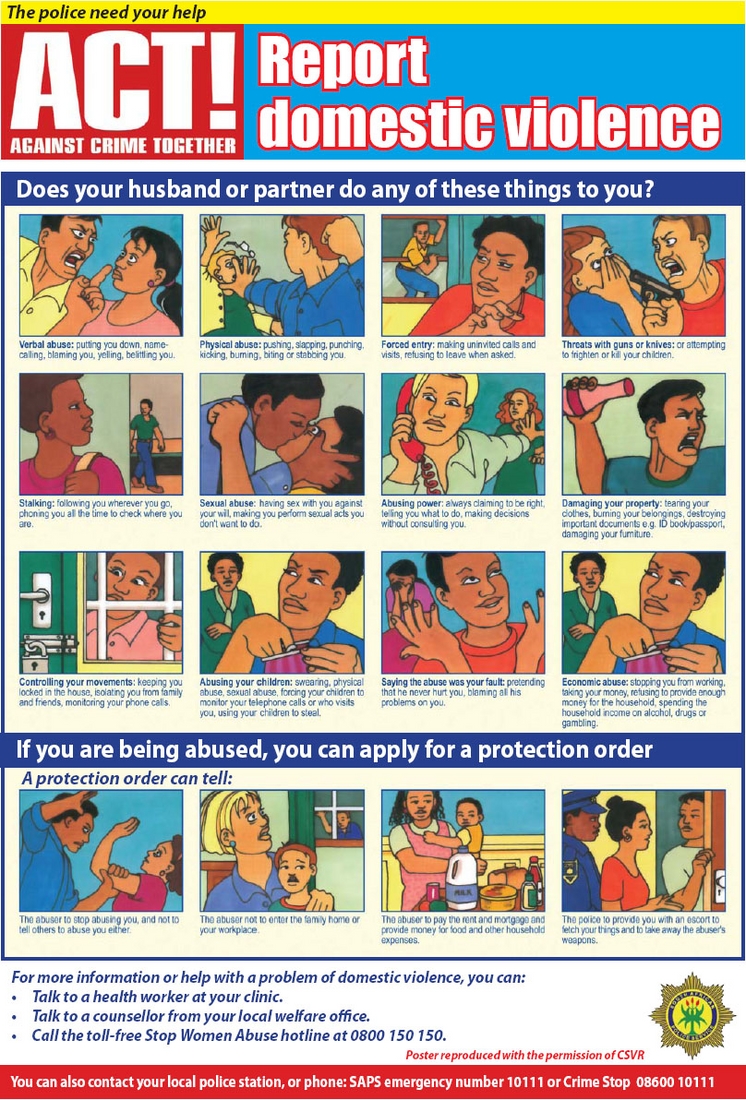
UMSOBOMVU YOUTH FUND
UMSOBOMVU YOUTH FUND sadmin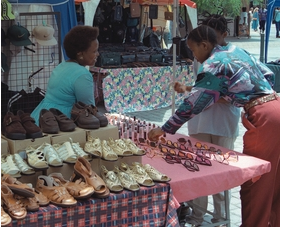 GOOD NEWS FOR WOMEN
GOOD NEWS FOR WOMEN
The Umsobomvu Youth Fund has good news for women who want to improve their lives. Women of all ages from previously disadvantaged backgrounds who want to start businesses or need to grow existing businesses, can now apply for money from the fund.
In the past, only young people between the ages of 18 and 35 from previously disadvantaged communities qualified for the Umsobomvu Youth Fund.
Bread-winners
Mbongeni Mtshali from Umsobomvu said studies have shown that more and more women are becoming the main bread-winners for their families. It was also found that women are better than men at repaying loans and that women were the worst affected by apartheid.
He said women could use their loans for business services like marketing and business plans or to grow their businesses. They can also apply for finance from the fund's many other funding programmes.
How to apply
To apply for funds from the Umsobomvu Youth Fund, you must:
- be a South African citizen from a previously disadvantaged community aged 18 to 35, or a woman of any age
- have a business plan for a new business or have an existing business
- give proof of your residential address and your identity document
- undergo a credit check
- show that the new or existing business will be able to repay the loan.
Loan officers
If you are not sure what to do, you can ask for help from a loan officer at a Umsobomvu Youth Fund branch near you. The loan officers are there to give advice and help you complete the application.
There are branch offices in all the provinces.
- Muzi Mkhwanazi
Women of all ages from previous disadvantaged backgrounds can now apply for money from the Umsobomvu Youth Fund to start their own businesses
For more information on the Umsobomvu Youth Fund, call 086 009 6884
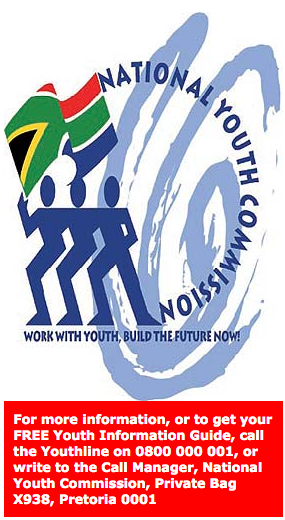 A NEW LOOK AT YOUTH DEVELOPMENT
A NEW LOOK AT YOUTH DEVELOPMENT
The National Youth Commission is developing a new National Youth Policy for youth development. This policy will replace the National Youth Development Policy Framework that is coming to an end in 2007.
Wise choices
The new policy will take a very broad look at youth development. This will include developing young people in such a way that they will get knowledge, skills and values that will help them to make wise choices about their lives throughout their lives. It will look at a wide range of important issues like how to lead healthy lives, education and skills development.
Workshop
A two-day workshop was held in July to talk about ways to include different contributions and suggestions into the draft policy. This took into account suggestions made by youth at a Policy Review Convention held in 2006. Young people from many youth organisations throughout the country attended the workshop.